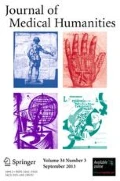Abstract
This paper reports on a rhetorical analysis of interviews with fifteen white Australian citizens who had undertaken offshore commercial surrogacy in India. Extending previous research, the findings suggest that genetic relatedness was valorized, and surrogacy constructed as a less tenuous route to family formation. The paper concludes with a discussion of the need for further research on 1) how the contentious nature of offshore commercial surrogacy may prevent full consideration of its ethical implications, 2) the differing belief systems between India and Australia in terms of children as alienable objects, and 3) ongoing consideration of how and when genetic-relatedness is made to matter.
Similar content being viewed by others
References
Billig, Michael. 1988. “Methodology and Scholarship in Understanding Ideological Explanation.” In Analysing Lay Explanation: A Case Book, edited by C. Antaki, 199–215. London: Sage.
Collins, Catherine, Damien W. Riggs, and Clemence Due. 2013. “Constructions of the ‘best interest of the child’ in New South Wales Parliamentary Debates on Surrogacy.” In Reframing Reproduction: Conceiving Gendered Experiences in Late Modernity, edited by M. Nash, 39–53. London: Sage.
Damelio, Jennifer and Kelly Sorensen. 2008. “Enhancing Autonomy in Paid Surrogacy.” Bioethics 22:269–277.
Dempsey, Deborah. 2013. “Surrogacy, Gay Male Couples and the Significance of Biogenetic Parenting.” New Genetics and Society 32:37–53.
Kroløkke, Charlotte and Saumya Pant. 2012. “‘I only need her uterus’: Neo-liberal Discourses on Transnational Surrogacy.” NORA: Nordic Journal of Feminist and Gender Research 20:233–248.
Kroløkke, Charlotte, Karen A. Foss and Saumya Pant. 2012. “Fertility Travel: The Commodification of Human Reproduction.” Cultural Politics 8: 273–282.
Markens, Susan. 2012. “The Global Reproductive Health Market: U.S. Media Framings and Public Discourses about Transnational Surrogacy.” Social Science and Medicine 74:1745–1753.
Millbank, Jenni. 2011. “The New Surrogacy Parentage Laws in Australia: Cautious Regulation or ‘25 brick walls’?” Melbourne University Law Review 35:165–207.
____. 2013. “Resolving the Dilemma of Legal Parentage for Australians Engaged in International Surrogacy.” Australian Journal of Family Law 27: 135–169.
Murphy, Dean A. 2013. “The Desire for Parenthood: Gay Men Choosing to become Parents through Surrogacy.” Journal of Family Issues 34:1104–1124.
Palattiyil, G., Blyth, E., Sidhva, D., & Balakrishnan, G. 2010. “Globalization and Cross Border Reproductive Services: Ethical Implications of Surrogacy in India for Social Work.” International Social Work 53:686–700.
Potter, Jonathan. 1996. Representing Reality: Discourse, Rhetoric and Social Construction. London: Sage
Raymond, Janice. 1994. Women as Wombs: Reproductive Technologies and the Battle over Women’s Freedom. North Melbourne: Spinifex Press.
Riggs, Damien W. 2015. “‘25 Degrees of Separation’ Versus the ‘Ease of Doing it Closer to Home’: Motivations to Offshore Surrogacy Arrangements Amongst Australian citizens.” Somatechnics 5:52–68.
Riggs, Damien W and Clemence Due. 2010. “Gay Men, Race Privilege, and Surrogacy in India.” Outskirts: Feminisms Along the Edge 22.
____. 2012. “Representations of Surrogacy in Submissions to a Parliamentary Inquiry in New South Wales.” Techne 16:71–84.
____. 2013. “Representations of Reproductive Citizenship and Vulnerability in Media Reports of Offshore Surrogacy.”Citizenship Studies 17:956–969.
Rotabi, Karen Smith and Nicole Footen Bromfield. 2012. “The Decline of Intercountry Adoptions and new Practices of Global Surrogacy: Global Exploitation and Human Rights Concerns.” Affilia: Journal of Women and Social Work 27:129–141.
Rudruppa, Sharmila. 2010. “Making India the ‘Mother Destination’: Outsourcing Labor to Indian Surrogates.” Research in the Sociology of Work 20:253–285.
Strathern, Marilyn. 1992. Reproducing the Future: Anthropology, Kinship, and the new Reproductive Technologies. Manchester: Manchester University Press.
Teman, Elly. 2010. Birthing a Mother: The Surrogate Body and the Pregnant Self. Berkeley: University of California Press.
Turner, Bryan S. 2001. “The Erosion of Citizenship.” The British Journal of Sociology 52:189–209.
Vora, Kalindi. 2009. “Indian Transnational Surrogacy and the Commodification of Vital Energy.” Subjectivity 28: 266–278.
Whitelaw, Anna. 2012. “Hundreds Pay for Overseas Surrogacy.” Sydney Morning Herald June 3.
Author information
Authors and Affiliations
Corresponding author
Rights and permissions
About this article
Cite this article
Riggs, D.W. Narratives of Choice amongst white Australians who undertake Surrogacy Arrangements in India. J Med Humanit 37, 313–325 (2016). https://doi.org/10.1007/s10912-015-9330-z
Published:
Issue Date:
DOI: https://doi.org/10.1007/s10912-015-9330-z




